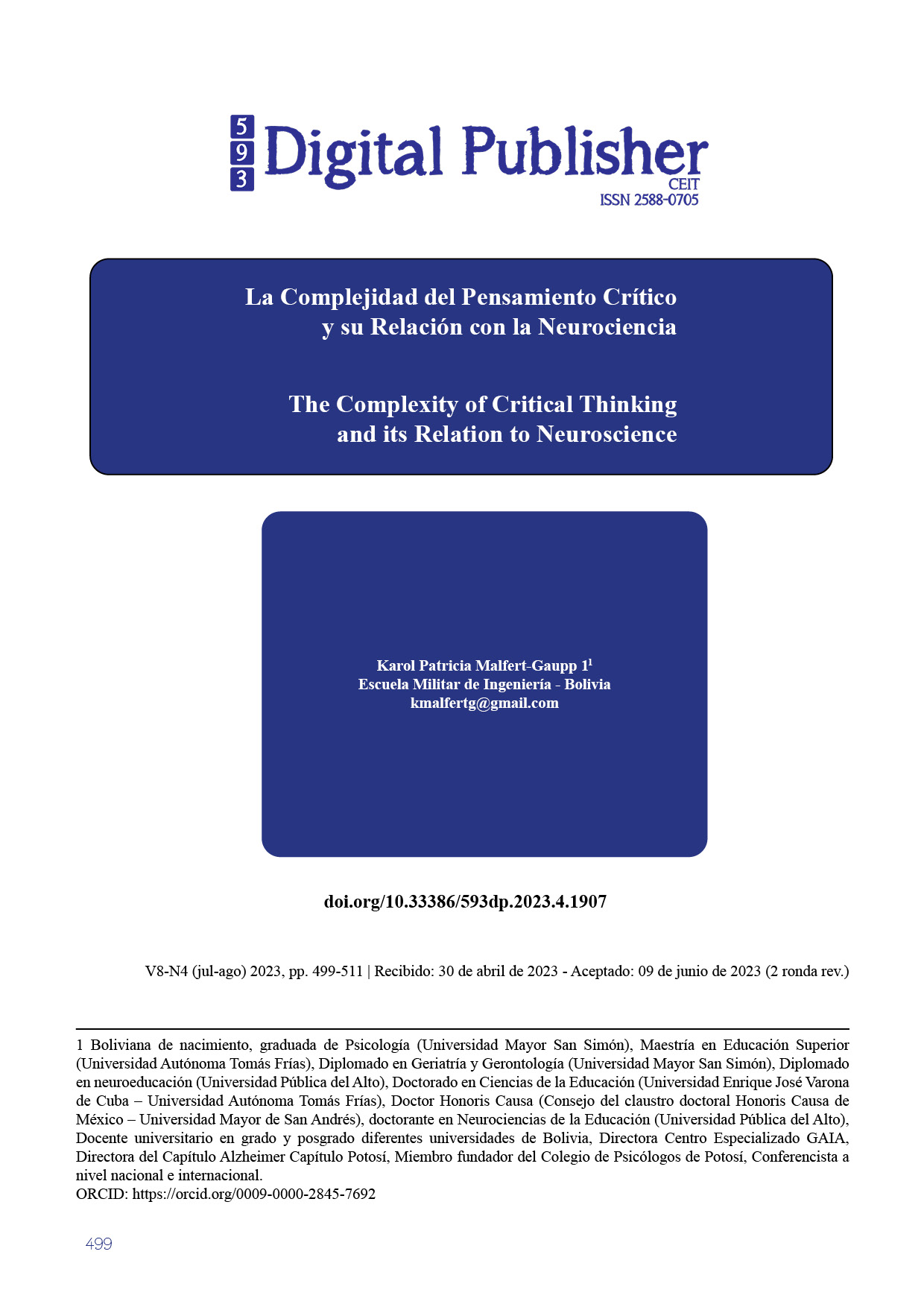The complexity of critical thinking and its relationship with neuroscience
Main Article Content
Abstract
Critical thinking is a cognitive skill that involves reflective analysis and systematic evaluation of information in order to make informed decisions. In the field of neurosciences, critical thinking becomes even more complex due to the intricate and multifaceted nature of the human brain. In this article, we explore the complexity of critical thinking in the context of neurosciences and discuss some of the challenges researchers in this field face.
First, critical thinking in the neurosciences implies the ability to integrate a wide range of knowledge and theories from diverse disciplines, such as psychology, biology, physics, and mathematics. In addition, neuroscientists must be able to understand and apply complex concepts such as neuroplasticity, neural connectivity, and neural network dynamics.
Another important challenge is the need to design rigorous and reliable experiments to investigate the human brain. Since the brain is extremely complex and heterogeneous, researchers must use a variety of neuroimaging and neurophysiology techniques to gain a detailed understanding of its functioning.
Downloads
Article Details

This work is licensed under a Creative Commons Attribution-NonCommercial-ShareAlike 4.0 International License.
1. Derechos de autor
Las obras que se publican en 593 Digital Publisher CEIT están sujetas a los siguientes términos:
1.1. 593 Digital Publisher CEIT, conserva los derechos patrimoniales (copyright) de las obras publicadas, favorece y permite la reutilización de las mismas bajo la licencia Licencia Creative Commons 4.0 de Reconocimiento-NoComercial-CompartirIgual 4.0, por lo cual se pueden copiar, usar, difundir, transmitir y exponer públicamente, siempre que:
1.1.a. Se cite la autoría y fuente original de su publicación (revista, editorial, URL).
1.1.b. No se usen para fines comerciales u onerosos.
1.1.c. Se mencione la existencia y especificaciones de esta licencia de uso.
References
BACON F. (2017) Novum organum, Edición Fondo de Cultura Económica
DE LA HERRÁN, A. (2011). Reflexiones para una reforma profunda de la educación, desde un enfoque basado en la complejidad, la universalidad y la conciencia. Educación XX, n.1, vol. 14, pp. 245-264. Disponible en http://www.uned.es/educacionXX1/pdf
DELGADO J.M. y otros. (1998) Manual de Neurociencia. Editorial Síntesis.
ENNIS R. (1989), Pensamiento crítico. Editor:Prentice Hall
ENNIS R. (1996), Un concepto de pensamiento crítico. Editor:Prentice Hall
FACIONE, P. (2007). Pensamiento crítico: ¿qué es y por qué es importante? Insight Assessment. California: The California Academic Press.
GLASER E. (2007), An introduction to critical thinking. www.criticalthinking.org
HALPERN D. (2014), Thought and knowledge: an introduction to critical thinking. Psychology Press Taylor & Francis
HEIMER L. y ROBARDS. M.J. (1982). Neuroanatomical Tract-Tracing Methods. Plenum Press.
KAHNEMAN D. (2012) Thinking, fast and slow. De bolsillo, Barcelona
KANDEL E. y otros. (2000). Principios de Neurociencia (Cuarta edición). McGraw-Hill Interamericana.
MERZENICH M. (1984), "Reorganización cortical de las representaciones sensoriales en mamíferos". Universidad Católica Cardenal Raul Silva Henriquez, Chile
MERZENICH M. (2013), "Soft-Wired: How the New Science of Brain Plasticity Can Change Your Life". Parnassus.
MILL J. (2017), sobre la libertad, Universitat de València
MILL J. (2019), El utilitarismo, London: Parker, Son y Bourn. Edición Digital
MORAES, M. C. (2007): “Complejidad, transdisciplinariedad y educación: algunas reflexiones”, Revista Encuentros Multidisciplinares nº 25, Vol. IX, pp. 4-13.
MORIN, E. (2001). Introducción al pensamiento complejo. Barcelona: Gedisa.
PAXINOS. G. (2004). The Rat Nervous System (Third Edition). Elsevier.
PAUL R. (2003), La miniguía para el pensamiento crítico conceptos y herramientas, Fundación para el Pensamiento Crítico (2008)
PAUL R. (2005), El pensamiento crítico: ¿qué es y por qué es importante? www.criticalthinking.org
PÉREZ LUNA, E.; Moya, N. A. y Curcu Colón, A. (2013). “Transdisciplinariedad y educación”, en Educere, vol. 17, núm. 56, enero-abril, 2013.
PUELLES L. y otros. (2008). Neuroanatomía. Editorial Médica Panamericana.
PURVES D. y otros. (2008). Neuroscience (Fourth Edition). Sinauer Associates.
RUSSELL, B. (1992). El conocimiento humano. Barcelona: Planeta-De Agostini (e.o.: 1948).
SERNA, E. (2016). “La transdisciplinariedad en el pensamiento de paulo Freire”, en Revista de Humanidades, núm. 33, enero-junio, 2016.
SHEPHERD. G. (1994). Neurobiology (Third Edition). Oxford University Press.
SIEGEL G.J. y otros. (2006) Basic Neurochemistry (Seventh Edition). Academic Press.
SQUIRE L. y otros. (2003) Fundamental Neuroscience (Second Edition). Academic Press.
TEILHARD DE CHARDIN, P. (1984). El fenómeno humano. Barcelona: Orbis.
TAUB E. (1993), "Constraint-induced movement therapy: a new approach to treatment in physical rehabilitation”. Springer Publishing Company
ZABALA, A. (1999). Enfoque globalizador y pensamiento complejo. Barcelona: Graó


